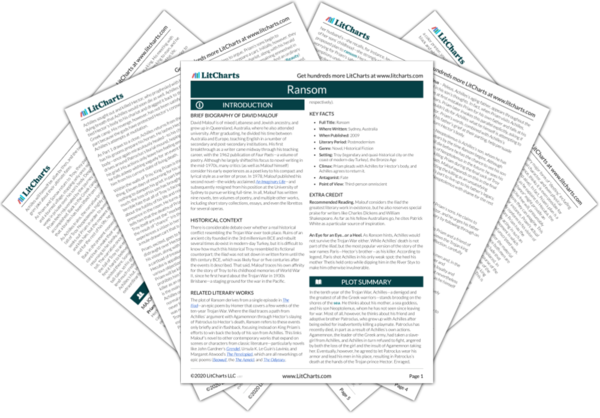Fate, Chance, and Change
In much of Greek mythology and literature, fate appears as an ultimate and inescapable force. This is certainly true of the stories surrounding the Trojan War, including the Iliad: in Homer’s version of events, the deaths of Hector and Achilles, and even the fall of Troy itself, are all preordained. As a retelling of a single episode from the Iliad, Ransom largely works within this same tradition, depicting the final destinies of…
read analysis of Fate, Chance, and ChangeIdentity, Humanity, and Mortality
Ransom focuses tightly on the inner worlds of two characters: Priam and Achilles. As the novel opens, however, neither of these characters has a particularly stable or unified sense of identity. Each is instead pulled in different directions on account of factors like their social roles as a king and a warrior and their interpersonal relationships. This is a distressing experience for both men, who feel variously uncomfortable with or alienated from different aspects…
read analysis of Identity, Humanity, and MortalityLanguage, Storytelling, and Empathy
In the Afterword to Ransom, Malouf says that he considers the novel to be, at heart, about storytelling. Given that the novel is a reworking of a preexisting story—told most famously in The Iliad—this is not surprising. Still, it is striking just how often Malouf interrupts the main narrative to tell a story-within-a-story. These interludes serve different purposes over the course of the novel, from offering necessary backstory to providing entertainment. Most importantly…
read analysis of Language, Storytelling, and Empathy
The Epic and the Everyday
Epic literature varies from culture to culture, but one core feature of the genre is its concern with people and situations that exist outside the bounds of normal human experience. The Iliad, for instance, deals with an epic event (the Trojan War) and is populated by characters who are either gods, demigods (e.g. Achilles), or royalty with abilities that verge on superhuman (e.g. Hector, Odysseus). Ransom, of course, takes its plot…
read analysis of The Epic and the Everyday






